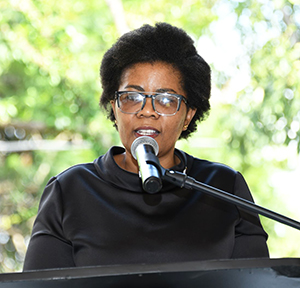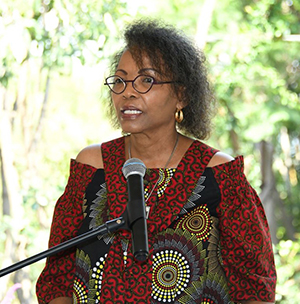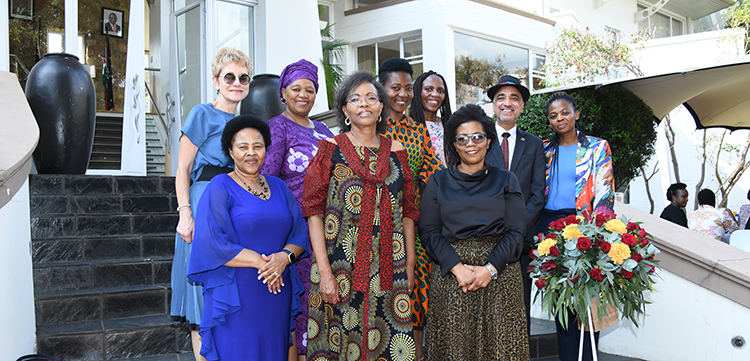News & Events
Building successful institutions for Africa

Prof Puleng LenkaBula (Unisa VC)
On Friday, 1 April 2022, the Kenyan High Commissioner to South Africa (SA), Catherine Muigai Mwangi, hosted a networking luncheon at her residence in Pretoria where Unisa’s Principal and Vice-Chancellor, Professor Puleng LenkaBula, was the guest speaker to an audience of African women leaders.
Gathered around a beautiful garden, the VC mingled and shared ideas with excellencies, ambassadors, lady high commissioners, and leaders of international organisations. Other Unisa leaders accompanying the VC to the event included Professors Zodwa Motsa, Puleng Segalo, Zethu Nkosi and Iqbal Jhazbhay, who is also SA’s former ambassador to the State of Eritrea.
Of importance, Professor Motsa was acknowledged as the newly appointed Unisa Vice-Principal, Teaching, Learning, Community Engagement and Student Support at the luncheon. ‘When women are appointed, they look for other women who are equally capable,’ said LenkaBula.
In her keynote address, LenkaBula shared her stimulating thoughts regarding the visions and futures that shaped her outlook and attitude towards Africa as a woman leader. She focused on Africa’s contribution to the global arena and the flourishing of humanity and ecology. To a loud cheer at the commencement of her speech, the VC observed April’s Fool Day and said, ‘Today I hope my thoughts will be remembered not for their foolishness but for inspiration – we should break the spell.’
Caring for ecology
Emerging from an ecosystem context, the VC stated that her beliefs are shaped by the African philosophy. She said: ‘I believe that we as human beings can never flourish if we do not think of ourselves as inextricably bound with the environment within which we live. The climatic challenges that we are having as the ecological degradation testifies to the idea that we as human beings, as women, are bound to caring for ourselves but also to caring for ecology.’
Further exploring the idea of human beings inextricably bound to each other, the VC also urged women to build institutions not only as children of Africa but also in solidarity and in support of multilateral relationships. ‘I think there are basic ideas, visions and futures that we should remind ourselves each time we meet like this to regenerate and reclaim the future,’ she said, ‘Or forming or co-constructing the future that we believe in.’ She discussed the continent’s history and development deeply during her talk.

High Commissioner and host Catherine Muigai Mwangi welcoming and introducing guests. ‘We get together as women leaders to exchange ideas and work.’
Citing Kenyan literary icon Micere Githae Mugo, the VC said, ‘We cannot think about institutions of higher education without thinking about courageous forebears of women who bore leadership speaking truth to power like her,’ she added, ‘Many of us who look up to her are reminded that the imperative of higher education also holds others and ourselves accountable in the co-construction of successful communities, countries, continents and the global world,’ she said. ‘We cannot talk about Africa and the role of women in building institutions that contribute to the success and the flourishing of our communities if we also do not delve into the analysis of power experienced in our communities, institutions as well as our countries.’
Imagine possibilities beyond challenges
Recognising the role of women in positions of power, the VC said it is important for women not to be naïve about the contradictions of patriarchy. She touched on diverse experiences of women being unrecognised for their leadership expertise.
‘It is not a combative reaction that we win in the building of institutions that care for humanity and for each other if we resort in the same patriarchal hierarchal approaches that we seek to transform. But it is often when women leaders try to work towards building social capital, social cohesion, and rallying around mentors and forebears who would have transcended some of the challenges that we would have gained,’ noted the VC.
Drawing from her career experiences, the VC said it is critical to include and listen to those who are resistant to the changes towards building of institutions. ‘They are our important constituencies,’ she advised. ‘Because if we listen to our voices only, we can never find the growth that is required for successful institutions. No matter the challenges we face in multilateral systems we should never lose our energy and courage to speak even if our voices shake,’ she said.
‘We should ensure that we replace cultures of domination with a world of participatory economics and participatory modes which are grounded in social democracy.’
Speaking about the history and existence of Unisa, the VC was proud to tell the gathering that Unisa is a trailblazer in inventing open, distance and eLearning education that is known and used globally. ‘The model was created in Africa by Africans, and it is used today worldwide.’ She explained the role distance education plays not only in our continent but also worldwide to promote access to higher education.
In closing, the VC encouraged further engagements towards reimagining and rethinking higher education to make this world a better place.

Unisans with the High Commissioner Catherine Muigai Mwangi and representatives.
*By Lesego Chiloane-Ravhudzulo, Journalist, Department of Institutional Advancement
Publish date: 2022-04-04 00:00:00.0

